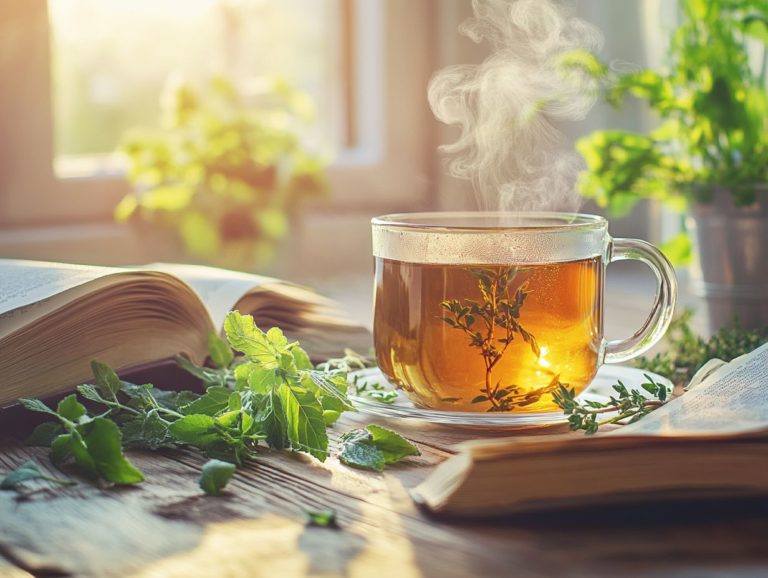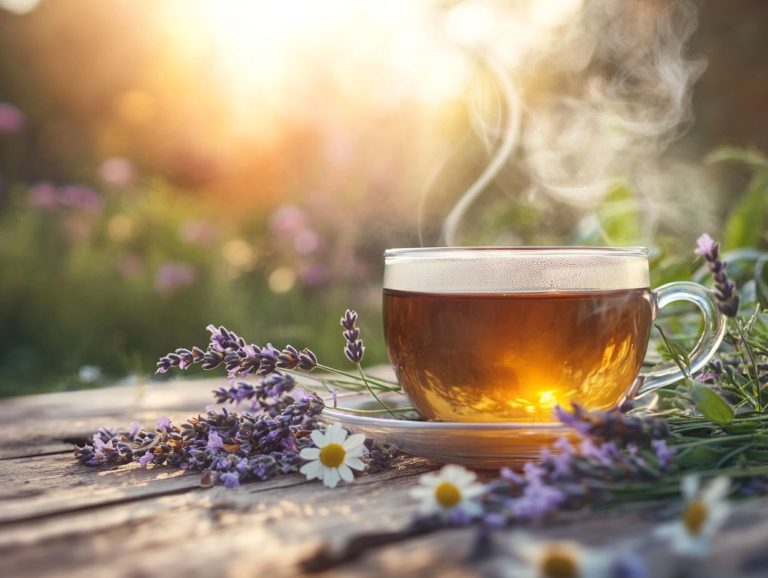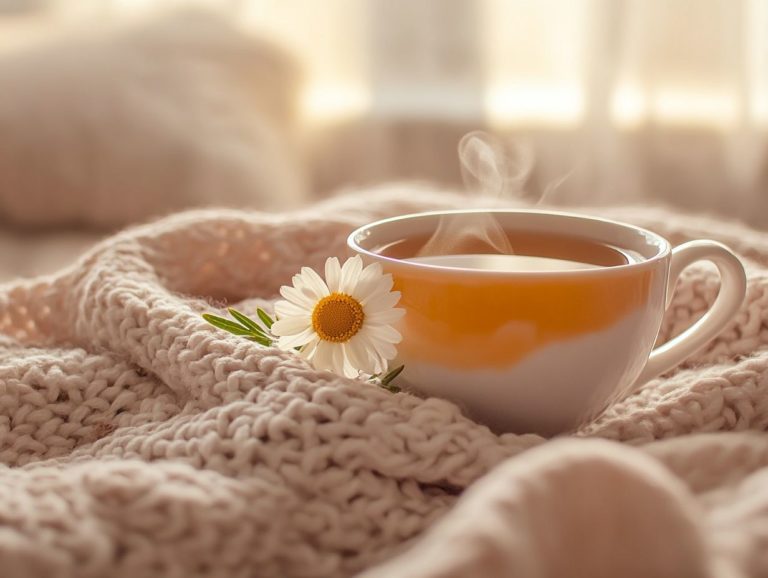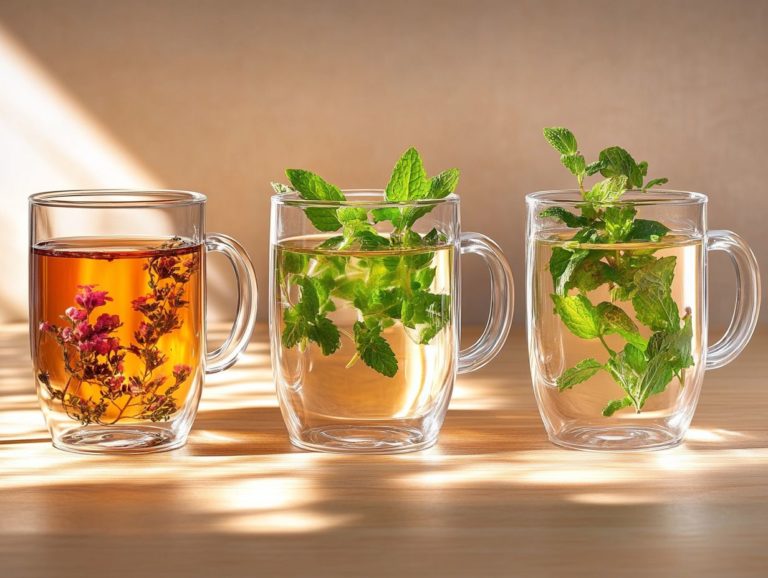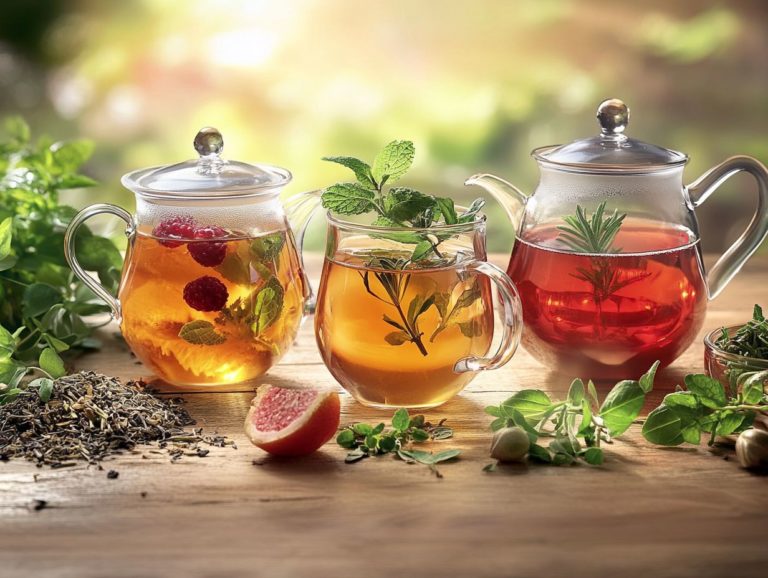The History of Herbal Tea: From Ancient Times
Herbal tea has intricately woven itself into the fabric of cultures worldwide. It is cherished not only for its delightful flavors but also for its remarkable healing properties.
This exploration delves into the origins and early uses of herbal tea, shedding light on traditional medicinal practices rooted in Chinese medicine and their cultural significance.
You ll discover popular varieties, each with its unique benefits, and the production methods that breathe life into these exquisite brews.
Uncover how contemporary trends are reshaping your enjoyment of herbal tea today! Dive in and experience the rich history and vibrant future of this beloved beverage!
Contents
Key Takeaways:
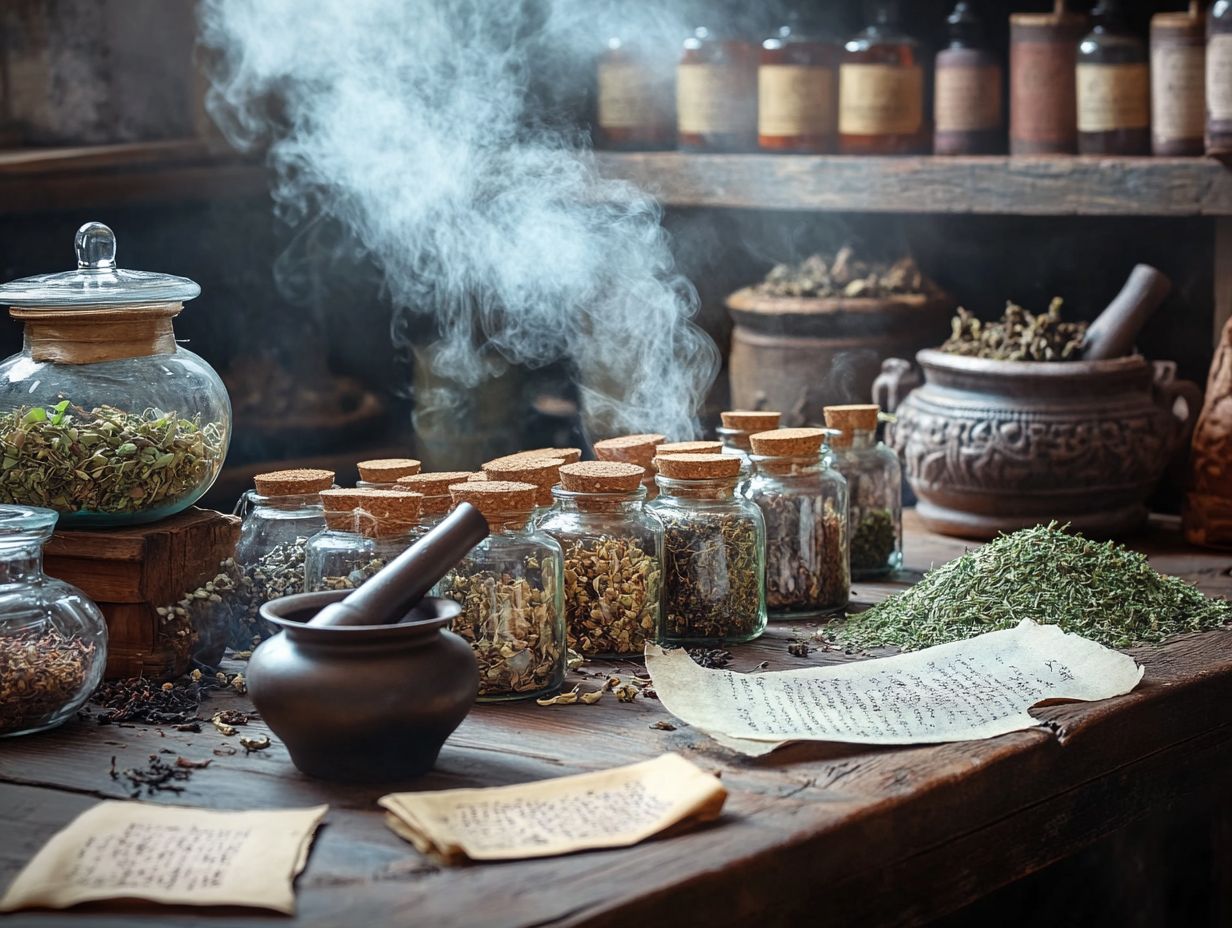
- Herbal tea has been used for centuries for its medicinal properties and cultural significance.
- There are a wide variety of herbal teas available, each with unique health benefits and production methods.
- Today, herbal tea is popular for relaxation, digestion, and overall wellness.
What is Herbal Tea?
Let s uncover what herbal tea truly is! Herbal tea, often called herbal infusions, is a delightful beverage that combines an enchanting mix of flowers, leaves, and herbs. It differs from traditional tea made from Camellia sinensis.
These herbal blends have been cherished for centuries, not only for their unique flavors but also for their impressive health benefits. Enjoy brain benefits, relief from depression symptoms, and even support for prostate health.
As wellness diets and natural remedies gain popularity, herbal tea is now popular in both Western and Eastern cultures. The rising popularity of energy tea presents a diverse range of options for those seeking invigorating and nurturing experiences.
Early Uses and Origins of Herbal Tea
You can trace the origins of herbal tea back thousands of years. It holds significant importance in Traditional Chinese Medicine. Influential figures like Shennong, often regarded as the ‘Father of Chinese Medicine,’ diligently documented the medicinal properties of various herbs along with their infusion processes.
Herbal tea has a rich history linked to holistic healing.
Traditional Medicinal Practices
Traditional medicinal practices have long celebrated herbal teas as a fundamental component in addressing a range of health concerns. Imagine sipping a warm cup infused with turmeric and ginger, both revered for their powerful anti-inflammatory and cognitive enhancement properties.
In various cultures, such as Traditional Chinese Medicine, you’ll find herbal teas brewed with ginseng, which are often relied upon to boost energy levels and sharpen mental clarity. Meanwhile, chamomile holds a special place in Western herbal medicine, cherished for its soothing effects that help alleviate anxiety and promote restful sleep. For more insights into these and other beneficial herbs, check out this guide to essential herbs.
In Ayurvedic traditions, ashwagandha is brewed to rejuvenate the mind and body, effectively mitigating stress and enhancing mental function. This rich tapestry of global herbal remedies illustrates how diverse cultures beautifully intertwine the healing powers of nature with everyday health practices.
Try brewing your own herbal tea today and discover the benefits for yourself!
Cultural Significance
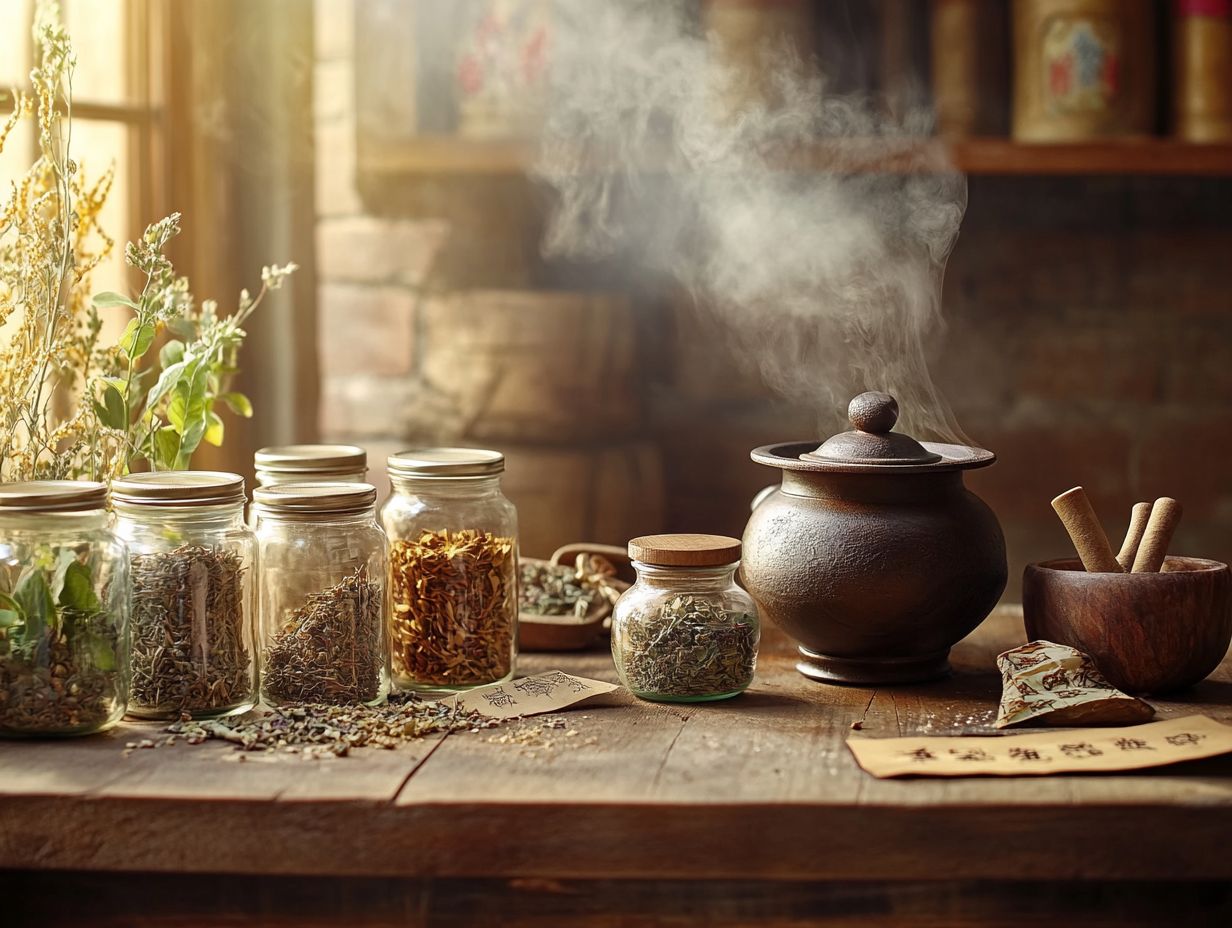
The cultural significance of herbal tea knows no bounds. It transcends geographical lines and finds a special place in tea culture, especially in the UK and the US. European merchants played a crucial role in popularizing these wellness beverages.
These merchants didn’t just introduce various blends; they transformed tea drinking into a cherished ritual. They seamlessly merged local customs with international practices. Across different countries, herbal tea has become an integral part of social gatherings. From the iconic afternoon teas in England to the ceremonial offerings in Asian cultures, it often symbolizes hospitality. As part of this tradition, herbal tea: a natural approach to wellness serves as a centerpiece for conversations, celebrations, and wellness rituals.
Herbal teas are now included in modern wellness diets, reflecting an increasing awareness of holistic health. Holistic health means considering the whole person—mind, body, and spirit—in wellness practices, showcasing how these ancient traditions continue to evolve. When selecting a beverage, it’s important to know how to choose the right herbal tea to best support your wellness journey and shape contemporary lifestyles.
Popular Types of Herbal Tea
Explore a delightful array of popular herbal teas, each boasting its own distinct flavors and health benefits. Among the most celebrated varieties are turmeric tea, energy tea, and herbal infusions crafted from Hibiscus and Moringa. All of these have found a dedicated following in the wellness community.
Each sip invites you to explore a world of wellness and flavor.
Varieties and Their Benefits
Among the vast array of herbal teas, each one presents a unique set of benefits. Renowned herbal remedies like Damiana Leaf and Ginkgo Biloba stand out for their potential to enhance cognitive function and promote overall wellness.
Teas like Peppermint and Rosemary are celebrated for their invigorating properties. They clear the mind and sharpen your focus. Peppermint tea provides a refreshing escape from mental fatigue, while Rosemary is praised for its remarkable ability to improve memory and support brain health. To learn more about these benefits, check out the history of herbal medicine.
This diverse selection appeals to various tastes and offers a natural approach to fostering mental clarity and emotional equilibrium. By weaving these herbal infusions into your daily routine, you can indulge in a calming experience that nurtures both relaxation and the stimulating advantages of heightened cognitive function.
How Herbal Tea is Made
The art of crafting herbal tea is a meticulous infusion process that draws out the rich flavors and medicinal properties of various herbs and botanicals. This careful preparation results in a beverage brimming with nutrients and health benefits, often serving as a valuable dietary supplement.
Production Methods and Ingredients
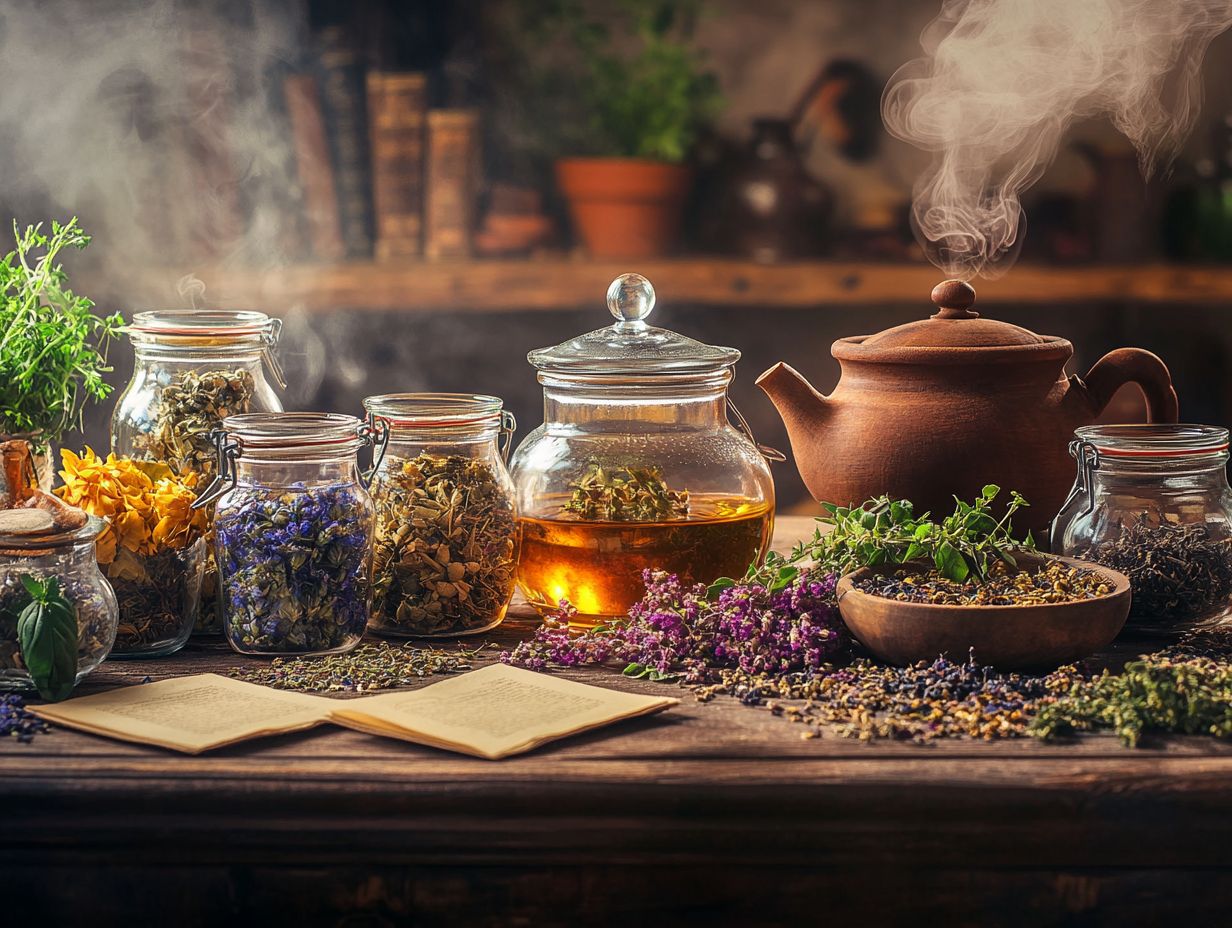
Herbal infusions are a delightful blend of various ingredients. They feature popular herbs like ginger, turmeric, and Ashwagandha, setting them apart from traditional teas made from Camellia sinensis.
Unlike the leaves found in classic teas, herbal concoctions draw from a diverse range of roots, flowers, and fruits. Each contributes its distinctive flavor and health benefits. Take ginger, for instance; it’s celebrated for its digestive advantages and anti-inflammatory properties, while turmeric is renowned for its powerful antioxidant effects. Additionally, exploring herbal tea for heart health can provide further insights into the benefits of these natural remedies.
The preparation methods also stand apart. Herbal teas typically require longer steeping times to fully extract those beneficial compounds, unlike the quick infusions common in traditional teas. By looking into these herbal tea types and benefits, you can savor not just rich flavors but also a wide spectrum of health benefits.
Modern Uses and Trends
In today s world, modern applications and trends surrounding herbal tea reveal a burgeoning recognition of its health benefits. You may find yourself among those increasingly integrating these herbal remedies into your wellness routine, seeking to alleviate various health concerns, including symptoms of depression.
Current Applications and Growing Popularity
The current applications of herbal tea have surged in popularity, especially in the US and the UK, where its health benefits are celebrated as part of the tea culture. You ve probably seen energy teas popping up everywhere and other herbal blends making their way into your daily routine.
This trend reflects a growing interest in holistic health and wellness, as more individuals like you seek natural alternatives to traditional remedies. Diverse cultures are beginning to weave herbal varieties into their everyday lives, transforming tea from a simple beverage choice into a lifestyle statement.
From calming chamomile to invigorating peppermint, each blend offers unique benefits that cater to your needs, whether it’s digestive support or relaxation. As more people embrace these natural options, tea culture evolves, with artisanal tea shops curating specialized blends that beautifully balance heritage and modern innovation. Explore the science behind herbal tea benefits to discover how these ingredients can enhance your well-being.
Frequently Asked Questions
What is herbal tea?
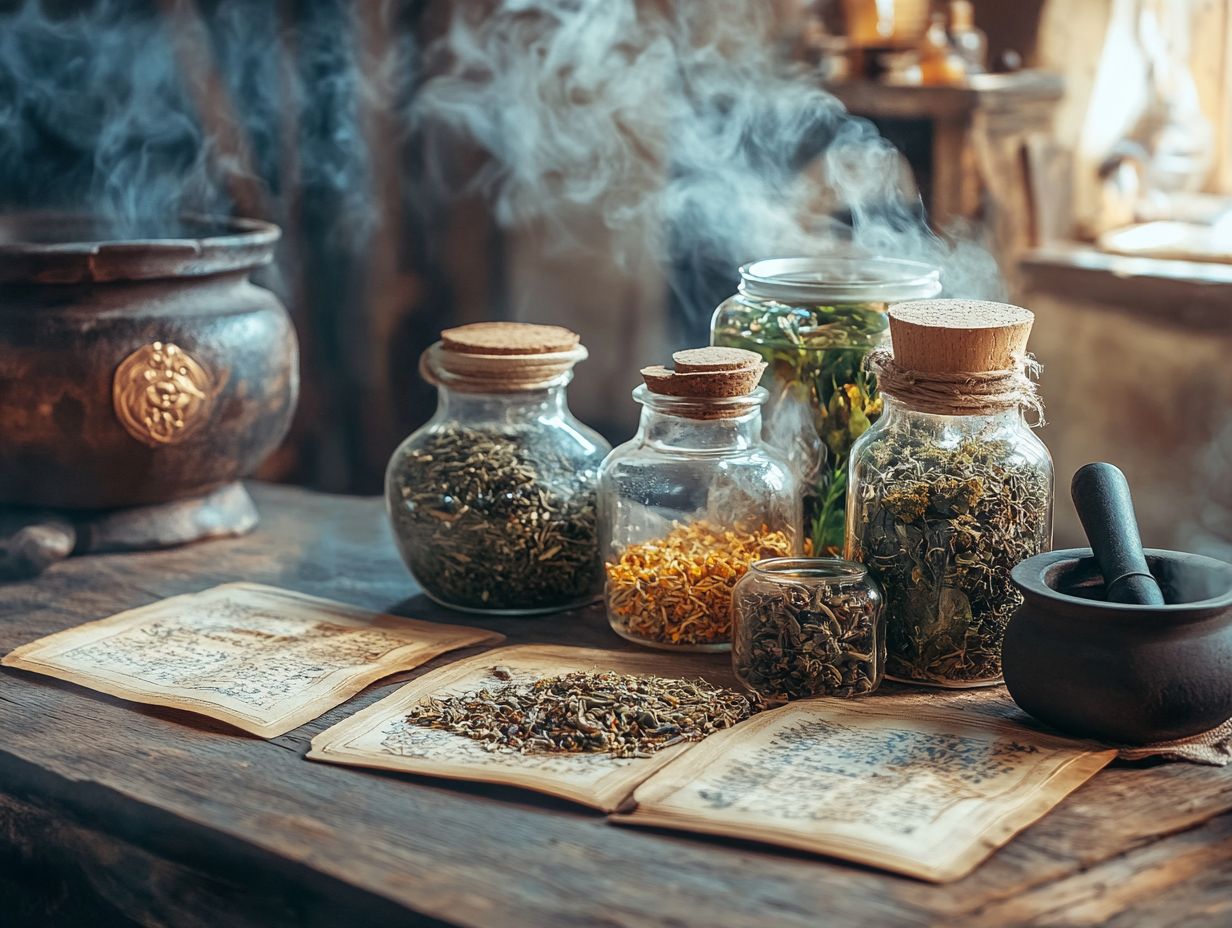
Herbal tea is a beverage made from steeping dried herbs, spices, or fruits in hot water. It does not contain any actual tea leaves from the Camellia sinensis plant, making it caffeine-free.
When was herbal tea first consumed?
The consumption of herbal tea dates back to ancient times, with evidence of its use found in ancient Chinese, Egyptian, and Greek civilizations. It was primarily used for its medicinal properties.
What are some common herbs used in herbal tea?
Some common herbs used in herbal tea include chamomile, peppermint, ginger, and hibiscus. Each herb has its unique flavor and potential health benefits.
How was herbal tea traditionally prepared?
Traditionally, herbal tea was prepared by steeping the herbs in hot water for several minutes and then straining the mixture before drinking. Some cultures also added honey or other sweeteners to enhance the taste.
What role did herbal tea play in ancient cultures and traditional medicine?
In ancient times, herbal tea was used not only for its medicinal properties but also played a significant role in cultural and spiritual practices. It was often used in ceremonies, rituals, and as a form of socializing.
How has the consumption of herbal tea and its varieties evolved over time?
Over time, the consumption of herbal tea has expanded beyond its traditional use as a medicinal beverage. It has become a popular alternative to traditional tea and coffee, with a wide variety of flavors and blends available in the market.

